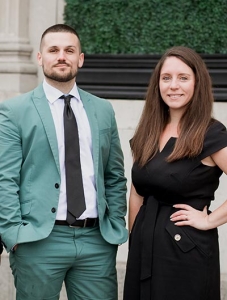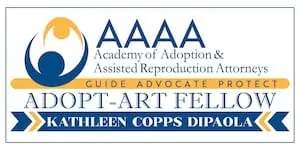Surrogacy
Attorneys & Staff Members Who Support this Practice Area
Surrogacy can be divided into two categories: (1) genetic surrogacy (sometimes referred to as “traditional” surrogacy), which involves a surrogate carrying a child that she is genetically related to; and (2) gestational surrogacy, which involves a surrogate (or “gestational carrier”) carrying a child that she is not genetically related to. Our firm occasionally handles genetic surrogacy cases, but the vast majority of our cases involve gestational surrogacy.
The surrogacy process typically follows these steps:
- Creation of embryos by the intended parents (sometimes via egg donation, sperm donation, or embryo donation)
- Matching of surrogate and intended parents (often via a surrogacy program, such as New York Surrogacy Center)
- Medical screening of the surrogate
- Psychological screening of the surrogate and intended parents
- Appropriate insurance policies purchased
- Wills signed by the intended parents
- Health Care Proxy and Living Will signed by the surrogate
- Drafting of the surrogacy agreement
- Funding of an escrow account
- Legal clearance letter sent to the fertility clinic
- Embryo transfer
- Pre-birth parentage proceeding during the pregnancy
- Birth of the baby with the intended parents listed as the parents on the birth certificate
Our firm has attorneys licensed in New York, Vermont, New Jersey and Pennsylvania and the laws regarding surrogacy vary in each of those states.
To see a summary of surrogacy laws across the country, visit U.S. Surrogacy Map | Surrogacy Laws By State (creativefamilyconnections.com).
New York Surrogacy
New York passed the Child Parent Security Act (“CPSA”) in April 2020 which legalized compensated gestational surrogacy as of February 2021. Under prior New York law, there were criminal sanctions for participating in surrogacy for compensation. That limited surrogacy in New York to compassionate (uncompensated) surrogacy, generally between family or close friends. The surrogate could only be compensated for the certain limited including medical and legal expenses. Under prior law, an adoption had to be completed after the baby was born unless the baby was genetically related to both of the intended parents. In that case, a paternity/maternity proceeding could be used.
Under the CPSA, if the surrogate and intended parents meet all eligibility criteria and their surrogacy agreement contains all of the necessary terms, it will be enforceable under New York law. One of the requirements of an enforceable surrogacy agreement is that both the intended parents and the surrogate are represented by independent legal counsel who is licensed to practice law in New York.
Intended Parents will also be able to obtain a pre-birth order of parentage, which declares them to be the parents of the child and declares that the surrogate and any gamete (i.e. sperm or egg) donors are not the parents of the child. Many courts in New York issue parentage orders without a court appearance, but a few counties require a brief virtual court appearance.
If a pre-birth order of parentage is obtained, the intended parents will be listed as the parents on the baby’s birth certificate.
Check out this great resource on surrogacy in New York, written by Attorney Joseph Williams.
Vermont Surrogacy
Prior to 2018, Vermont had no statute or case law prohibiting compensated surrogacy, so compensated surrogacy was routinely occurring, and intended parents were amending the birth certificates of their babies after birth. In 2018, Vermont passed the Vermont Parentage Act, which formalized the requirements for surrogacy in Vermont and allowed for pre-birth orders of parentage to be obtained by intended parents. Court appearances are almost never required in order to obtain a parentage order in Vermont. With a pre-birth order of parentage, the intended parents are listed on the baby’s original birth certificate. Attorney Kathleen “Casey” Copps DiPaola practices surrogacy law in Vermont.
New Jersey Surrogacy
Prior to 2018, New Jersey refused to enforce surrogacy agreements. In 2018, New Jersey passed the New Jersey Gestational Carrier Agreement bill, which allows for gestational carrier agreements to be enforced if they meet certain requirements. If those requirements are met, a pre-birth order of parentage can be obtained, and the intended parents can be listed on the baby’s original birth certificate. One unique aspect of the New Jersey law is that it does not allow for compensation to surrogates, but rather it allows for the intended parents to pay her reasonable living expenses. In practice, this works the same way as compensation but different terms are used in the surrogacy agreement in order to comply with NJ law. Attorney Kathleen “Casey” Copps DiPaola practices surrogacy law in New Jersey.
Pennsylvania Surrogacy
There is currently no statutory law governing surrogacy in Pennsylvania. Instead, it is governed by caselaw and administrative regulations from the Pennsylvania Department of Health. Assuming your surrogacy agreement and parentage petition meet the requirements of the Department of Health, a stipulation can be filed with the court before the child is born resulting in a pre-birth order of parentage. When the baby is born, a Supplemental Form of Assisted Conception is completed, and a birth certificate will be issued, listing the intended parents as the legal parents of the baby. Attorney Joseph Williams practices surrogacy law in Pennsylvania.
Copps DiPaola Silverman is happy to partner with Carrot Fertility!
![]()







